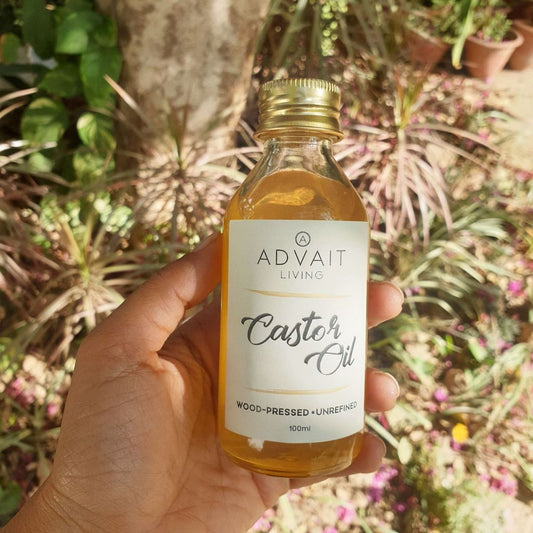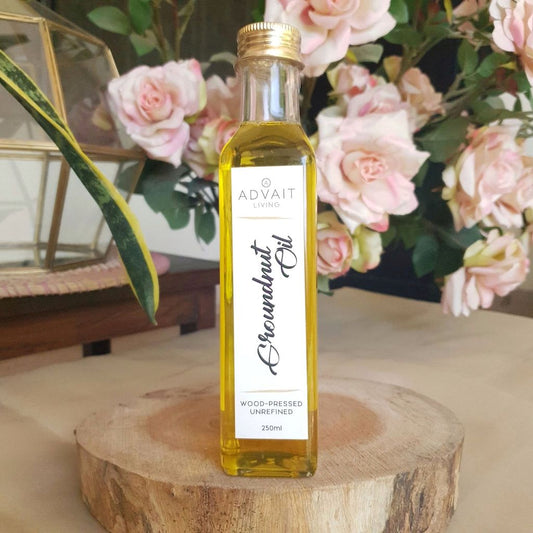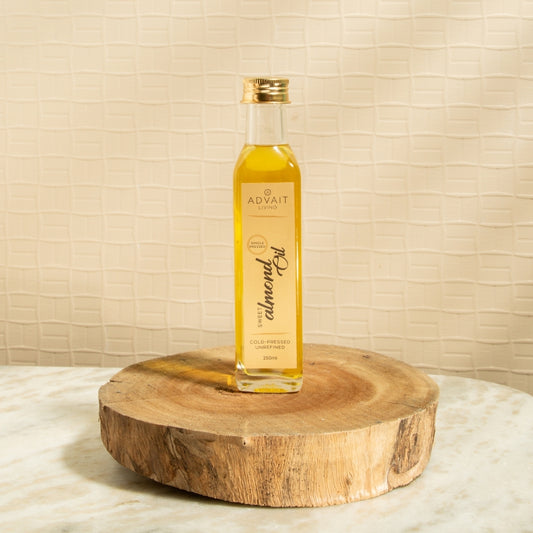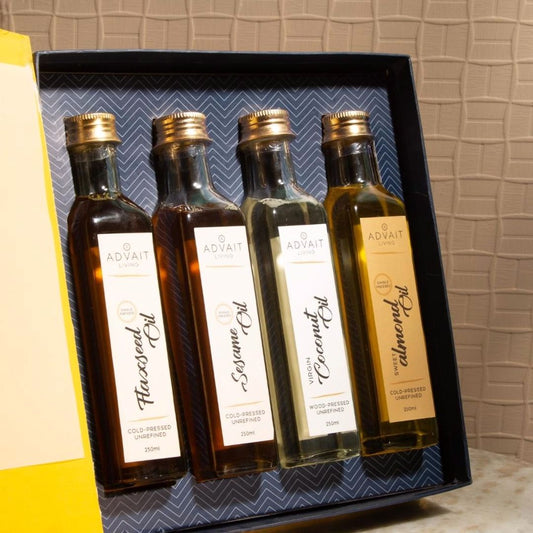Cold pressed cooking oils are gaining popularity in comparison to refined oils available in the market. They are fast replacing industrially-produced oils, but what does a cold pressed oil really mean, and is there any real difference between them.
Cold Pressed vs Refined Oils
Oil is extracted from nuts, grains, husks, and other fibrous materials through pressing. There are multiple methods to extract oil.
The term "cold pressed" may lead one to believe that oil extraction occurs in cold temperatures. However, that is not the case. Cold pressed simply refers to the mechanical pressing of seeds to extract oils without the use of heat solvents. In reality, the process of crushing seeds generates friction, which produces some heat. Cold pressing technique aims to minimize heat and keep the seeds as cool as possible during oil extraction.
Oils extracted using chemical solvents and heat are known as "solvent based oils" or 'refined oils'.
Here is a quick guide on how to spot the difference between cold pressed and refined oils.
1. Origins
Cold Pressed oils have been around for centuries; and in India, archaeological evidence indicates that mustard and (cold pressed) mustard oil have been in use since as far back as Indus valley civilization in around 3000 BCE. For an oil pressing technique that old, we certainly have come a long way.
Modern technology gave rise to “refined oils” and the first emergence of refined oils can be traced to as recent as mid 1800’s. Over the course of history, several attempts were made to advance machinery and technology for improved oil production. But it was only in 1840’s that Jesse Fisher from Birmingham, England developed the first practical technology for solvent-based extraction of oil (that gave birth to refined oils).
Not only did this technology dramatically improve oil yield, but it could also process even low oil-bearing materials like soybean, rice bran and cottonseed cake, which wasn’t possible with mechanical pressing. In 1856, when Deiss of England obtained the first patent for extraction of oil using solvents, the foundation for the growth of ‘refined vegetable oil’ was cemented and today solvent extraction has become the standard practice in the vegetable oil industry.
In India, this technology only arrived in 1940’s when the first-ever solvent extraction plants were set up (mostly in Gujarat). In the beginning, the technology was mostly used for the production of refined groundnut oil. But the real boom in the solvent-extraction industry took place from 1970’s onwards when the Indian agri-research institutes, in collaboration with University of Illinois USA, popularized soyabean cultivation that grew rather rapidly in Madhya Pradesh, Rajasthan and Maharashtra.
Hence, cold pressed oils have a long-standing tradition that dates back centuries, making them an age-old practice. On the other hand, refined oils are relatively more recent, with a history spanning less than 150 years.
2. Extraction process
Cold pressing typically relies on mechanical power to extract oil, without the use of any solvents, and as such maintains low temperatures during the oil extraction process. The temperature are carefully controlled, usually kept below 50°C or even lower depending on the specific equipment used. This meticulous temperature control significantly contributes to the preservation of the oil's nutritional compounds.
In contrast, commercially produced refined oils employ the solvent-extraction method that involves the use of solvents and heat.
A solvent is a molecule that has the unique ability to dissolve with other molecules and pull them from their fibrous or solid material (in the case of seed oils - the seed meal or fibrous content of a seed). Hexane-gas, a chemical solvent derived from petroleum, is a standard solvent being used by the refined oil industry. It has the capability to dissolve and mix with the oils during the extraction process and literally wash out the oil from the seed shell.
The other aspect of solvent-extraction is the application of heat. Heat is required throughout the refining process, rather the temperatures at each step is strictly controlled. The temperatures start from 85 degrees celsius and reach as high as 260 degrees celsius or more as varied temperatures are needed to clean or 'refine' the solvent-extracted oil. However, application of heat changes the molecular bonds of the oils and produces undesirable free fatty acids, peroxides, and p-anisidine among other changes.
3. Production or Yield
The yields produced vastly differ for both the aforementioned processes. The total quantity produced, therefore cost of production, becomes the yardstick for choice of operation. Refined oils are the outcome of solvent extraction method and is preferred by the industry , as it is far more efficient in extracting oil from a seed vs cold pressed method. Remarkably, it is capable of removing virtually all of the oil available in the oil seed giving a yield of 60-70% or more. On the other hand, cold pressed method yields only 30-40% oil, rendering it to be more expensive as a method of extraction.
4. Oil Recovery Process
Refined oils need to undergo ‘oil-recovery’ or ‘re-fining’ process once the oil is extracted. This recovery process separates the dissolved hexane from oil by evaporation and distillation and other methods. Usually, refined oils undergo the following steps to separate the residual hexane from the edible oil and to remove impurities that are a by-product of the extraction process:
- Degumming (to remove gums)
- Deacidification or Neutralizing (to remove free fatty acids)
- Decolourization or Bleaching (to remove color),
- Dewaxing or Winterization (to remove waxes)
- Deodorizing (to remove odor and taste)
Harsh treatments, chemicals, very high heat, and straining are used to remove the solvent from the oil, Free Fatty acids (that emerge during the extraction process), residual soaps and gums, trace metals, and unpalatable flavours and ordors! These processes render the oil inferior in taste, fragrance, appearance and especially nutritional quality.
Most of the ‘impurities’ are formed either during the extraction process with application of solvents and extreme heat or due to the unpalatable of the nature of oilseed itself (many oilseeds are not consumable by humans in their raw form). These impurities need to be removed to “stabilize the oil”, mostly because of the rising demand by the food processing industry for cheap frying oil. Other impurities such as ‘color, odor, texture and taste’, need to be tweaked by the manufacturers to make the oil more cosmetically enhanced to entice the home consumer.
Cold pressed oils, on the other hand, are obtained without undergoing any such treatment or without altering the oil. The oil is mechanically pressed and separated and is left as is. It is allowed to naturally sediment over a period of time and once the sediment has settled, the oil is filtered using cheesecloth to get pure, raw and unrefined oil. No nutritional loss occurs.
5. Free Fatty Acids
Quality of commercial oils and fats is determined by the presence or rather the absence of Free Fatty Acids (FFA). One of the main by-products of the solvent method is the production of free fatty acids (FFA) in refined oils, due to hydrolysis of oils and due to application of heat. Higher temperatures produce higher amounts of free fatty acids. FFA are less stable than neutral oil (or unrefined oil) and easily oxidize and become rancid. They are also associated with the undesirable darkening of colour, off-flavouring and may also reduce the smoke point of an oil. Furthermore, deterioration of the quality may lead to reactive and toxic product formation that can be hazardous to health.
Hence, FFAs are reduced or neutralised from refined oils (or heat-solvent oils) through application of soapstock or bleaching and deodorizing among other refining processes. An alkali like caustic soda is added to the tank causing a reaction that leads to the formation of soap stock that settles at the bottom of the tank and is then removed.
On the other hand, natural and cold pressed oils are primarily composed of naturally occurring glycerides of fatty acid obtained only from vegetable sources. No production of free fatty acids happens due to extraction methods.
6. Trans Fatty Acids
Heat-solvent oils may be hydrogenated. Hydrogenation is the process whereby a hydrogen molecule is added to the oil in the presence of a catalyst. Hydrogenation of oil, is a useful process as it allows modification of characteristics to maximise use of the oil such as different melting points will have different industry application or production of more stable oil. However, hydrogenation produces undesirable trans fatty acids, which have been directly linked to coronary heart diseases and other health risks.
World health organisation has called for the global elimination of industry produced trans fatty acids in fats and oils. Many countries have banned partially hydrogenated fats and oils, however, India has issued a limit of 2% trans fatty acid in fats/oils instead.
Cold pressed oils, as per a study, did not show any presence of trans fatty acids isomers, whereas in refined oils, subjected to refining and deodorising processes, these isomers occurred at approx 1%.
7. Nutritional Properties
Refining of oils renders unpalatable oils suitable for human consumption. It is also undertaken to remove undesirable contaminants and to increase suitability for home and industrial applications. However, refining of oils dramatically effects the nutritional content and bio-availability of the oils.
Research indicates that each step of the refining process produces undesirable losses of micronutriments. For example physical refining process of refined sunflower oil induced a total loss of 41% in tocopherols (antioxidants). Total phytosterols (reduces blood cholestrol and is anti-cancerous) decreased by 60% during chemical refining process. The most losses of squalene (promotes cell hydration and is anti-inflammatory), up to 17% occurred at the deodorisation step.
Cold pressed oils are mostly single pressed oils. A study was conducted on lemon seed oils that compared the quality and stability of oils using both methods - cold pressed vs hexane-extraction. Evidence showed that free fatty acids, ACs, peroxide values and p-anisidine values were significantly lower in cold pressed oils, indicating a superior quality of oil. These oils typically also had higher phenolic content and antioxidant capacity, suggesting higher oil stability and nutritional value.
Research also indicates higher levels of bio-active compounds in cold pressed oils. Furthermore, they contain valuable nutrients such as — essential fatty acids, phospholipids, antioxidants such as tocopherols (eg. Vitamin-E) & phosphatides (eg Lecithin), sterols, hydrocarbons (squalene), carotenoids among others. Much more than their heat-solvent / refined oil counterparts.
8. Preservatives and Additives
No chemicals, additives, or preservatives are added to virgin or cold-pressed oils. These oils contain natural flavours and aromas. Conversely, heat-solvent oils are deodorized, bleached, coloured, and processed extensively to obtain specific flavour, colour, taste and aroma.
9. Environmental Cost
One must also evaluate the hidden environmental cost of both extraction methods. Cold pressed or wooden kohlu processes are simple, mechanical and chemical-free. Little energy is required to operate these machines. And most importantly, they are safe to operate and free from any production of toxic fumes or by-products.
On the contrary, several studies have revealed that hexane is highly toxic and can affect the neural system when inhaled by humans. Residual hexane causes toxicity and hence can be extremely hazardous. Moreover, hexane can easily escape into the environment, during the production process, and react with pollutants to form ozone and photo chemicals.














































